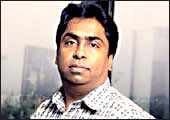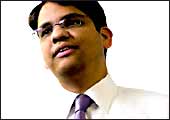 |
| Sterling’s Sivasankaran: What
next? |
His reputation for buying
companies and selling them is legendary. Over the years, C. Sivasankaran,
founder of the Sterling Group, picked up a cellular telecom business
from the RPG Group and eventually offloaded it on Maxis of Singapore;
sold his broadband business to VSNL, and divested 33 per cent in
Tamilnad Mercantile Bank. Last fortnight, Sivasankaran lived up
to his reputation by selling the coffee business of the Sterling
Group, comprising Fresh & Honest Café (which focusses
on vending filter coffee and other beverages) and Barista (a coffee
shop format). The deal size is pegged at $125 million (Rs 550 crore),
although Sterling Group officials did not confirm it. This recent
transaction perhaps lacked the element of surprise packed in his
earlier deals, as talks with the buyer, Lavazza of Italy, were protracted.
While Barista provided the brand and perhaps the entry interest
for Lavazza, Fresh & Honest gives it an existing platform
of profits. Fresh & Honest Café was started 10 years
back; by March 2004 it was making profits of Rs 12 crore on a
turnover of Rs 50 crore. Since then, the number of vending machines
has more than doubled (roughly 400 machines get installed every
year). At last count, the company had 2,350 vending machines installed,
a turnover of close to Rs 125 crore and profits of Rs 30 crore.
"Our expertise lies in providing vending machines in places
that would do good business and we advise our franchisees and
corporate clients on minimum viability requirements," says
R. Shivashankar, CEO, Fresh & Honest Café. The company
maintains all the machines installed and also provides the raw
materials (coffee seeds, tea bags, noodles, etc.). With Sivasankaran's
benchmark of getting back at least 10 times the EBITDA (earnings
before interest, depreciation, tax and amortisation), Fresh &
Honest has been a major contributor to his kitty.
Sivasankaran reportedly purchased Barista Coffee Company from
Turner Morrison (65 per cent) and the Tatas (34.31 per cent) for
Rs 30 crore and Rs 65 crore, respectively. After Sterling's acquisition,
90 outlets were added to the existing stable taking the total
to 175 outlets in India and 12 outlets across the UAE, Sri Lanka
and Oman. The additional investments amounted to Rs 120 crore.
"The overseas outlets were positive on profits, but overall,
the company has just started reporting EBITDA profits," says
CEO Partha Duttagupta. 2007-08 is expected to be the turnaround
year for Barista.
With Sivasankaran exiting the coffee business, the Sterling
Group does not have anything worthwhile in its portfolio except
for the Aiwo chain of restaurants for health food conscious people.
But there are big forays expected in the wind electricity generation
segment. With Sivasankaran, however, you never know what's going
to be next on his plate.
-Nitya Varadarajan
Super-growth
Ambitions
Cognizant aims to double revenues in 18 months.
 |
| Cognizant’s D’Souza:
Big plans |
From $1 billion to $2 billion
in 18 months works out to a compounded annual growth rate of 58.74
per cent, and it's a strike-rate promoters would give an arm and
a leg for. It certainly isn't impossible-not at least in the high-growth
sector of it services. Cognizant is the company that's attempting
this top line caper; that's the guidance it has issued, along with
operating margins of 20 per cent (which it is currently achieving).
If it does get there, it would have grown faster than Infosys, which
took 23 months to move from $1 billion to $2 billion. For its part,
Cognizant crossed the $1 billion mark in 12 years, as against Infosys,
which took 23 years.
Now for the caveats: Cognizant is young (it was started in 1994;
Infosys in contrast is 26 years old); it has a multinational parent
in Dun&Bradstreet, and is listed on the Nasdaq in the US;
and is headquartered in that country (although it has a development
centre in Chennai), thereby enjoying proximity to its client base.
In its defence, you could argue that Cognizant is doing the same
thing that Infosys, Wipro et al are: Leveraging the India advantage
of cost and quality.
Traditionally, Cognizant has been focussed on a limited number
of geographies, industry verticals, customers and solutions and
has expanded this each year. North America contributes the major
chunk of revenues (86 per cent), financial services is its mainstay
(with a 48 per cent contribution) and application outsourcing
brings in over 90 per cent of revenue. "Strategic investments
in these areas have resulted in us winning marquee customers,
resulting in higher growth and market leadership," says Francisco
D'Souza, President & CEO, Cognizant. What's more, financial
services grew by 54 per cent and applications outsourcing (through
repeat business) grew by 96 per cent, validating the bread and
butter strategy. The company added 14,500 professionals (or 60
per cent of its headcount) in the calendar year 2006 and ended
the year with 38,800 professionals (Infosys has 69,432 employees).
While 75 per cent of its headcount is in India, over 85 per cent
of its global hiring gets done out of India.
But to hit $2 billion by January 2008-Cognizant touched $1 billion
in the June-ended quarter of 2006-would call for a new strategy
and D'Souza is set to make the big shift. "The services value
chain is becoming global much like the manufacturing supply chain.
This will involve a paradigm shift from labour arbitrage to intellectual
arbitrage," he says.
-Nitya Varadarajan
Win-Win
Connection
Vodafone has a partner, and Essar
a nice bail-out option.
 |
| ONGC’s Sharma: Fair
play |
Arun Sarin couldn't stop smiling last fortnight,
after the Foreign Investment Promotion Board (FIPB) was well on
its way to clearing Vodafone's takeover of Hutchison Telecom's majority
stake in Hutch-Essar. The CEO of the world's largest mobile phone
operator had ample reason to be content: Vodafone finally got management
control of an Indian telecom company. At the same time, Sarin also
managed to allay the fears that the Ruias of Essar-33 per cent stakeholders
in the JV-had about Vodafone's entry. Not only has Essar Group Vice
Chairman Ravi Ruia been anointed Chairman of the JV, to be called
Vodafone Essar, the Ruias have the option to sell their stake in
the JV to Vodafone for $5 billion (Rs 22,000 crore). This suits
Vodafone too, as it has sidestepped the hassle of looking out for
a new ally in India.
Sarin has set out some serious targets for the newly rechristened
company, which will soon sport the Vodafone logo. He's aiming
to be the largest Indian wireless provider by 2010 with a market-share
of 22-25 per cent, a marked increase from the current share of
16-17 per cent. However, the competition is not fazed by such
statements, "One foreign-owned operator has sold out to another
one, I don't see anything changing much," says Sanjeev Aga,
Managing Director, Idea Cellular. "Hutch was a great competitor
and I expect Vodafone to be tough competition as well, but nothing
we haven't seen before," adds Sunil Mittal, Chairman, Bharti
Enterprises.
Significantly, Vodafone recently signed a memorandum of understanding
(MoU) with Bharti-Airtel to share infrastructure, but now with
Essar on board, the MoU might have to be revisited, as Essar,
too, has a company that provides such services. "It is only
a MoU, and nothing has been finalised yet," is how Sarin
put it, although he did clarify that the fastest way for operators
to reach deep into interior India would be to share resources.
"I expect Vodafone to be very strongly focussed on the
rural markets," says Neeraj Aggrawal, Director, Boston Consulting
Group. Sarin, who plans to bring in "really low-cost"
handsets to India from ZTE of China in the current year itself,
wants to make "affordability a non-issue." However,
other operators and particularly handset manufacturers such as
Nokia are skeptical about the low-cost handset model. "People
also want their phones to offer them some degree of features as
well as a social image, even in rural India, and really low-cost
handsets will do neither," D. Shivakumar, Managing Director,
Nokia India explains.
Whether low-cost handsets work or not is still to be seen, but
Vodafone is serious about India, after putting down serious amounts
of money-all of $11.1 billion (Rs 48,840 crore)-to enter the country.
But Sarin does have one man to thank. "The first call that
Arun made was to me. He said 'I want to buy this (Hutch)', I said
'Go', he was stunned," Mittal says, "because he needed
my approval." Hopefully, Mittal will not end up regretting
his decision.
-Kushan Mitra
|







